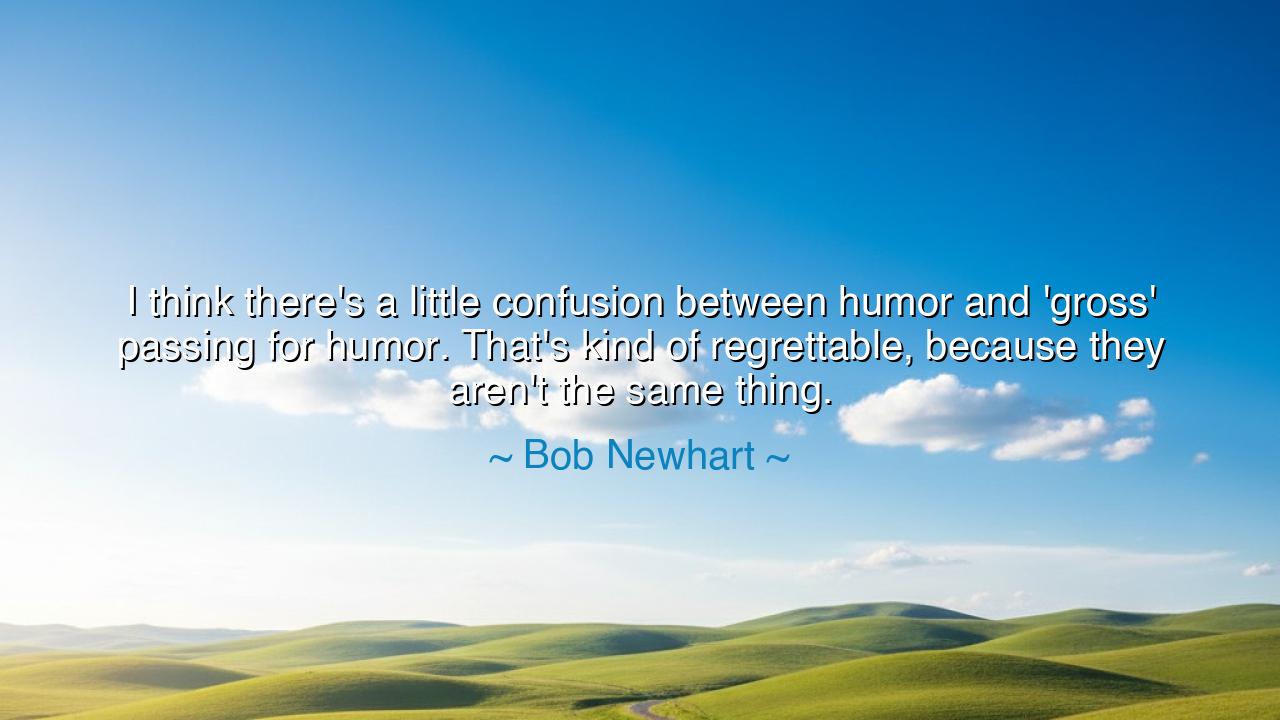
I think there's a little confusion between humor and 'gross'
I think there's a little confusion between humor and 'gross' passing for humor. That's kind of regrettable, because they aren't the same thing.






In the great and ancient tradition of wisdom, where the philosophers of old sought the deepest truths of the human soul, there lies an understanding that humor is not just an instrument of laughter, but a sacred tool for insight. Bob Newhart, in his wisdom, once spoke a truth that cuts to the very heart of the human experience: "I think there's a little confusion between humor and 'gross' passing for humor. That's kind of regrettable, because they aren't the same thing." With these words, Newhart speaks of a confusion that has plagued the ages—grossness mistakenly standing in place of true humor. He calls upon us to reflect on the nature of laughter, to distinguish the true from the false, and to recognize that humor, when done with wisdom and grace, elevates the soul, while crudeness only diminishes it.
In the ancient days, humor was never a tool of degradation but of revelation. Socrates, in his dialogues, often employed a kind of ironic humor, using questions and playful remarks to lead others toward profound self-understanding. His humor was sharp and deep, but it never descended into crudeness. He understood that true wisdom was not to be found in mockery or ridicule, but in the gentle laughter that arises when we confront the absurdities of life. The wisdom of the ancients teaches us that humor that comes from a place of clarity and insight serves to uplift the spirit, not drag it down into the muck of grossness. Newhart’s words, then, are a call to return to the essence of humor that does not rely on shock or excess, but on truth.
Consider the example of Aristophanes, the great comedic playwright of ancient Athens. His plays were filled with biting satire and humor that often pierced the veil of society's pretensions. Yet, while his humor was sharp, it was never vulgar. He used humor to reveal the flaws in human nature, to hold a mirror up to the soul and show the ridiculousness of pride, greed, and corruption. His humor was a reflection of deep thought, a wisdom that invited the audience to laugh at themselves, to see through the facades of their own lives. Newhart, too, shares in this tradition. His humor is never base; it is a quiet, refined wit that reflects the world’s contradictions with grace. Gross humor, in contrast, seeks to entertain not by revealing but by shocking or offending. It appeals to the basest parts of the human spirit and, in doing so, risks stripping humor of its nobility.
The lesson from both the great philosophers and Bob Newhart is clear: true humor lies not in the grotesque or the exaggerated, but in the subtle and the refined. Gross humor may elicit a momentary laugh, but it does not bring with it the lasting joy of true understanding. It is like the difference between a shallow, fleeting spring and a deep well that nourishes the soul. In our own lives, we must be wary of mistaking crudeness for humor. We must not allow the cheap and the vulgar to overshadow the quiet, thoughtful wit that brings us to greater insight. To indulge in the base is to lower the human spirit; to embrace the true humor of the ancients is to lift it.
Marcus Aurelius, the great Stoic emperor, often reflected on the nature of human life with a humor that was dry and insightful, never cruel. His writings are filled with moments of deep irony, where he observed the folly of human striving with a knowing smile. In these moments, there is a laughter that is born not from mockery, but from understanding. It is the laughter of a soul who has seen the contradictions of life and accepted them with peace. The humor that Aurelius espoused is the very same that Newhart brings to his audiences—a humor that recognizes the absurdity of the world without descending into the crude or the gross. It is a humor that uplifts and nourishes, rather than diminishes and corrupts.
We, too, must learn to discern between true humor and the gross that masquerades as humor. In our world today, we are bombarded with voices that seek to entertain through shock and outrage, through exaggeration and crudeness. Yet, the greatest humor comes not from the shock of the base, but from the clarity of the refined. True humor is born of wisdom, not of vulgarity. It is a reflection of life as it truly is—both absurd and profound—without the need for crudeness to make it palatable. As we walk through our lives, let us remember the lesson of Newhart and the ancients: that humor, when done with insight and restraint, can be a guiding light for the soul, while the gross will only lead us deeper into darkness.
Let us then choose the path of true humor—the humor that elevates the spirit, that builds rather than destroys. Let us seek the kind of humor that, like the great philosophers, allows us to laugh at the world’s contradictions without degrading it, that invites us to see life’s absurdities with a clear and gracious heart. And as we laugh, let us remember the ancient wisdom: that true humor is not born of crudeness, but of insight. Through this, we can find a deeper joy, one that will not fade with time, but will remain with us as a light in the dark.






AAdministratorAdministrator
Welcome, honored guests. Please leave a comment, we will respond soon